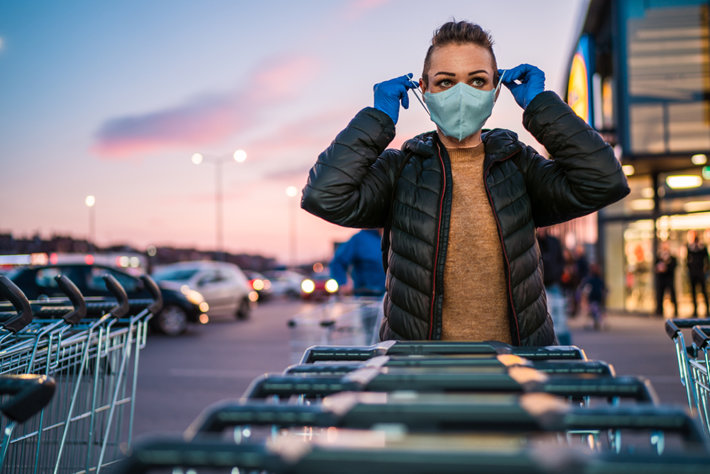Holding Onto Recovery During Hard Times

Because of the coronavirus pandemic, the U.S. is facing both a health crisis AND an economic crisis. That makes things particularly difficult for those in recovery. Even if they are sober now and have been for some time, those who spent years using drugs may be more likely to catch illnesses, especially respiratory infections, due to drug-related lung damage. That creates fear among recovering addicts that because of their past drug use, they may be more likely to contract COVID-19.
The goal has to be not only staying home and not spreading COVID-19, but also staying sober and not relapsing while in quarantine. If recovering addicts can stay sober and healthy through all of this, they can resume their jobs and lives and avoid a dangerous incident.
What can recovering addicts do in their day-to-day lives? What are some healthy habits and daily rituals that people in recovery can take on to ensure they do not relapse?
Tips for Staying Sober During a National Health Crisis
Someone who has beaten drug addiction or alcohol addiction is someone who’s already accomplished a great feat. Getting sober may just be the first step, but no one can deny that it is a considerable one.
Unfortunately, not everyone who achieves sobriety stays sober. Relapses do occur, and people in recovery need to remain vigilant and commit to a sober life no matter what. Below are 15 strategies and action items that people in recovery can take on during the coronavirus pandemic to ensure that the national health crisis does not push them over the edge and into a relapse.
1). Protect yourself from risky situations. During a crisis, nerves may be stretched, tensions will be high, and stress levels can peak. Now more than ever, it’s crucial to avoid old environments where you may have used drugs. It’s time to stay away from old bars, haunts, and “stomping grounds.” It’s time to steer clear of friends who still use substances.
2). Seek help and support from your family and sober friends. There’s never anything wrong with doing this. If you feel like you are struggling, if you feel like you may be nearing a relapse, do not hesitate to seek help and support from those who care about you, those who want you to live a sober and healthy life.

3). Take on new healthy habits. With a major national health crisis in full swing, now more than ever recovering addicts should commit to healthy lifestyles. People in recovery from drug and alcohol use may be more at risk of contracting coronavirus, especially if they used drugs that harmed their lungs. Furthermore, eating well, drinking plenty of water, and getting a good night’s rest every night can help reduce stress and foster a better, more positive outlook. Also be sure to take supplements, especially immune booster.
4). Apply the lessons you’ve learned. If you are in recovery, you likely learned some valuable lessons to get to where you are today. What were those lessons? Remind yourself of them, go over them again if needed, and seek to garner renewed resolve and determination.
5). Take part in meaningful activities. Part of sobriety is taking part in activities that matter and that have worth, activities that produce a positive result. Now more than ever, when recovering addicts are told to stay at home, it couldn’t be more essential that they find meaningful activities to take part in daily.
6). Manage stress with positive experiences. Stress levels are bound to rise during a crisis. Counter out stressful emotions with positive experiences. Read books, watch movies, clean, cook, engage in a hobby, landscape the yard, host game nights with the family, etc.
7). Manage and reduce physical pain safely. When recovering addicts struggle with physical pain, that can sometimes prompt a relapse (usually onto opiate drugs). Find healthy ad safe ways to manage and reduce pain, be it from stretching, exercising, eating better, sleeping differently, or taking non-drug-based pain relief supplements.
8). Find out who you can help. One of the best ways to avoid personal risk in recovery is to find out who you can help. Struggling? Help someone. Suffering? Help someone. A lot of people are on hard times right now, and helping someone through a troubling moment or assisting someone with a particularly challenging task can boost your morale by seeing them through their struggle.
9). Maintain a daily schedule. There is much to be said for a routine, for the calming aspect of a reliable, dependable schedule. Many people feel as though their daily lives have been completely disrupted because of the coronavirus pandemic. For the duration of the quarantine and social distancing, it would be advisable to create a new schedule, something reliable and consistent that you can adhere to every day within your home.
10). Bond with your family. If you live with a spouse, children, parents, or siblings, now is a fantastic time to connect with them and foster healthy relationships with them. Reforming healthy relationships with sober family members should be a goal for any recovering addict. Staying at home with family every day affords an excellent opportunity to do just that.

11). Be physically active every day. Idle hands are the Devil’s workshop indeed, and that could not be more accurate than during the COVID-19 health crisis. It’s crucial that during a stay-at-home period, you not become lazy, shiftless, or inactive. Make a point to exercise every day. The daily endorphin release can help improve your mental state, and regular cardiovascular activity can boost your immune system and help keep you healthy.
12). Look for part-time work that you can do from home. While the health crisis has disrupted many industries, not all have suffered. If you have skills that could be utilized via a computer, seek to make use of such skills. Doing so will keep you active and focused while also providing an income stream during these difficult times.
13). Seek to live with purpose. There was a reason why you chose to break free from drugs and alcohol and seek a sober life. What was the underlying meaning behind your efforts to get clean? Why did you stop using addictive substances? Remind yourself of this every day to boost your commitment to a drug-free life.

14). Continue to educate yourself. There is a wealth of knowledge out there in the tens of millions of published books. Use this time as an opportunity to learn something new. Read books on recovery and strategies for staying sober, or simply learn about a new subject that interests you.
If You Need Help…
Sometimes, despite their best intentions and efforts to stay sober, recovering addicts do relapse. If this has happened to you, there are helpful Narconon staff members ready to assist you in treatment. A relapse doesn’t mean that you lost everything that you worked so hard for. But it does mean that you need to seek additional help to create stable and unshakable sobriety.
If you or someone you know has relapsed and gone back to using drugs, please reach out to Narconon Ojai. A completely drug-free life is within your grasp. You need only reach for it.
Sources:
- https://www.telegraph.co.uk/health-fitness/mind/like-recovering-alcoholic-coronavirus/
- https://www.bbc.com/news/uk-52139895
- https://www.everydayhealth.com/pain-management/natural-pain-remedies.aspx
Reviewed and Edited by Claire Pinelli, ICAADC, CCS, LADC, RAS, MCAP

